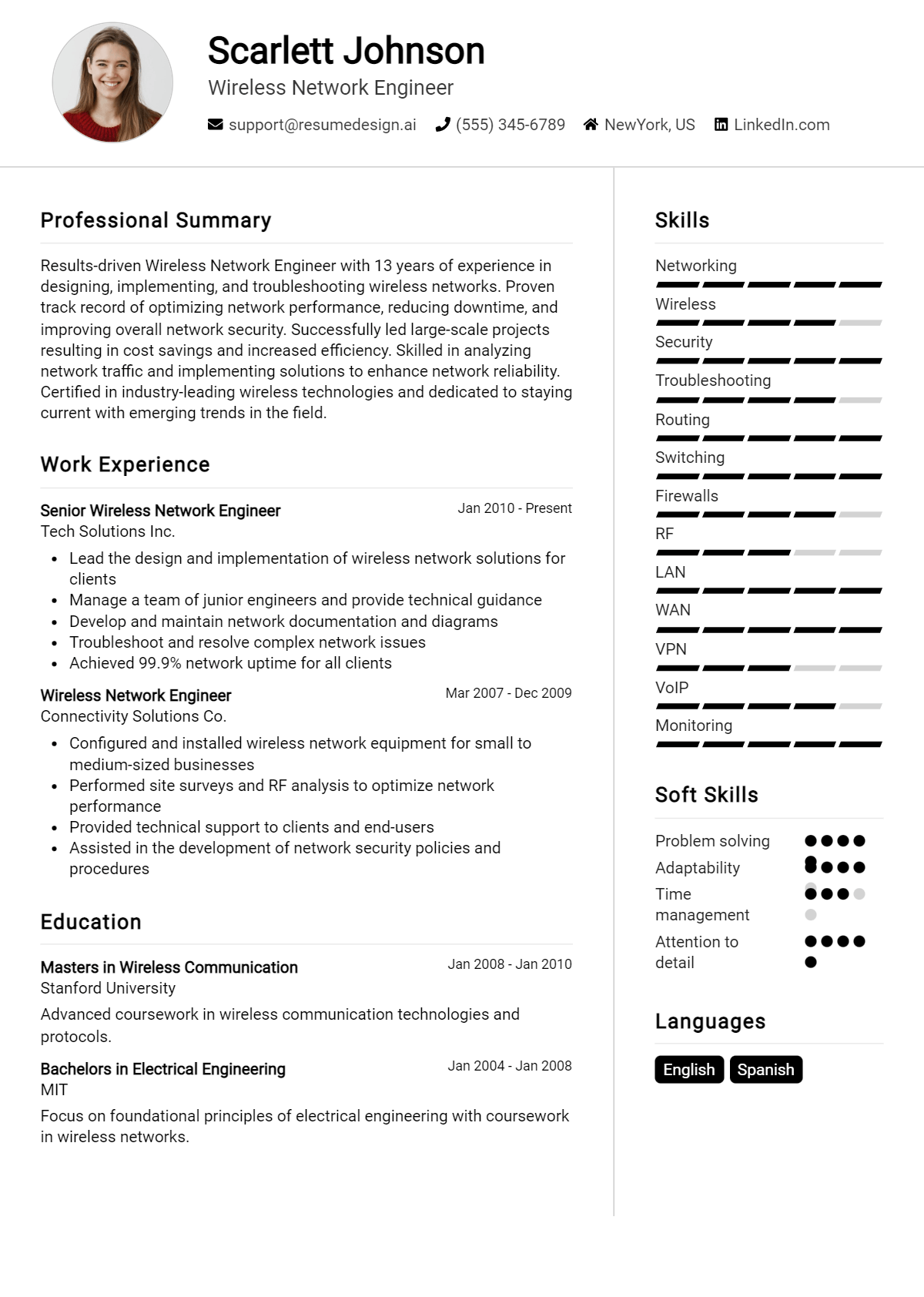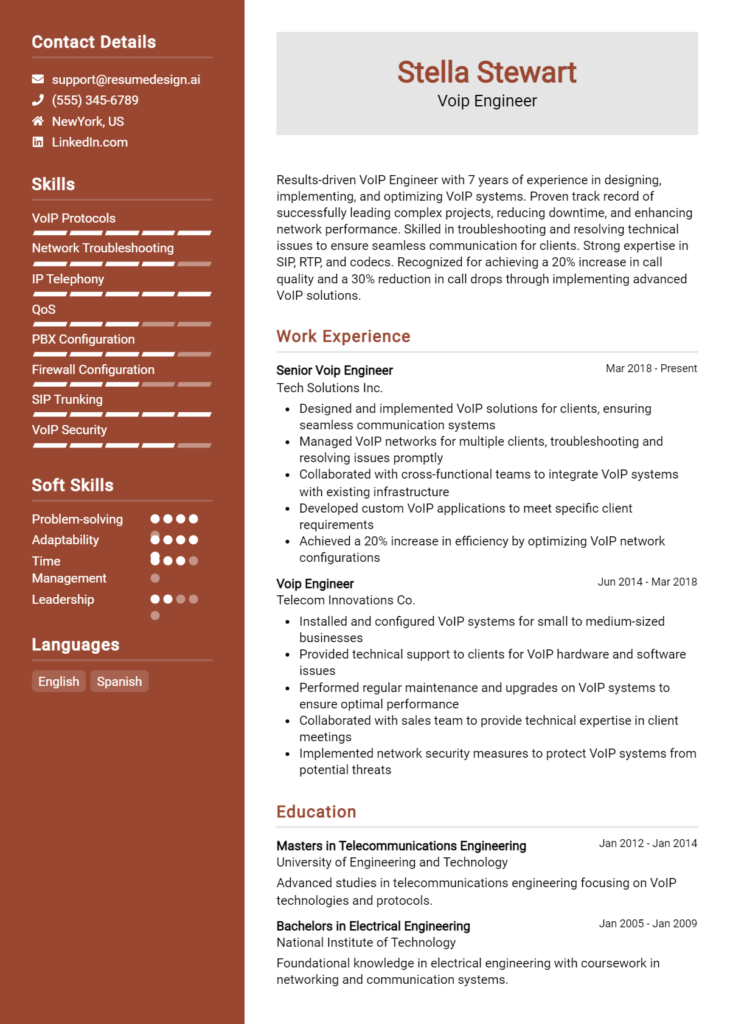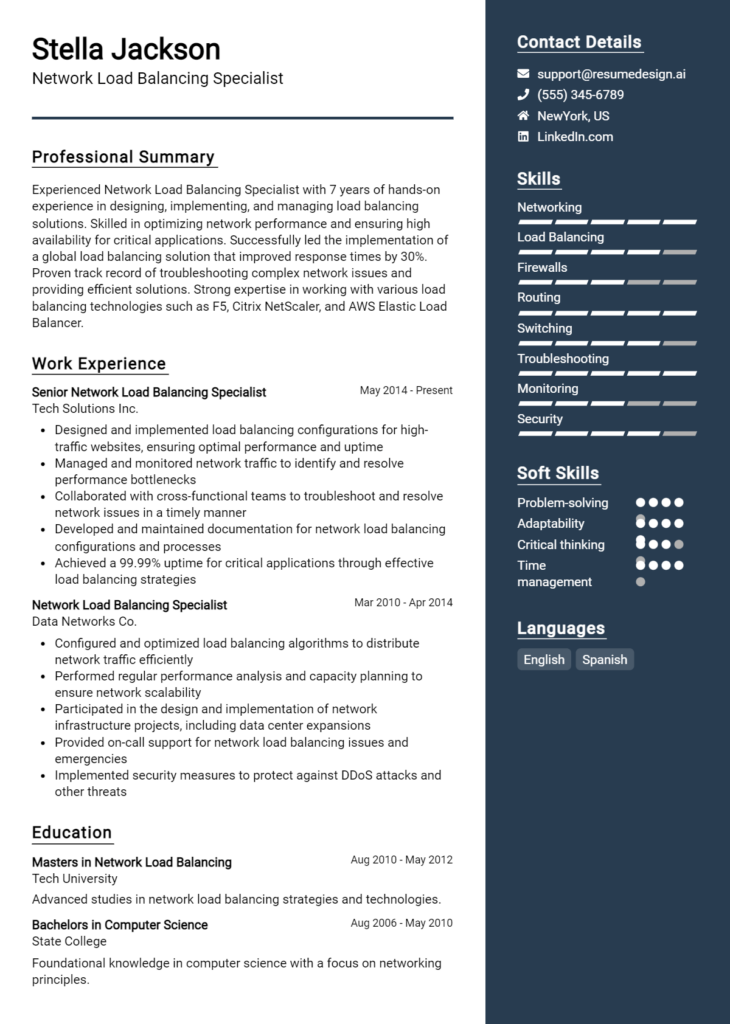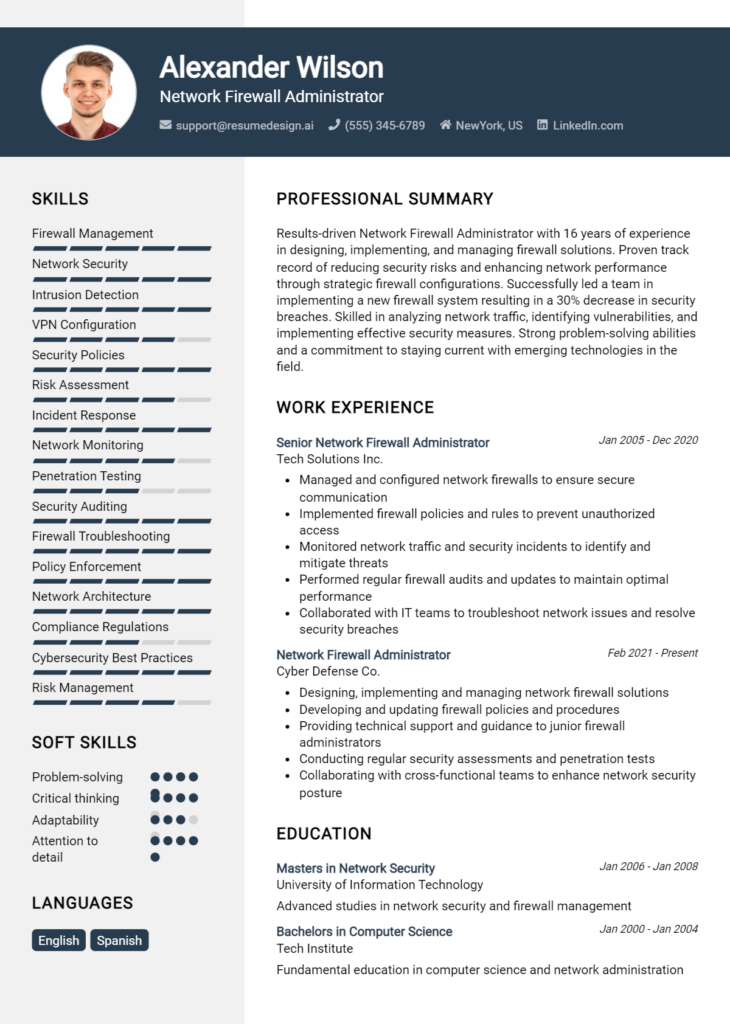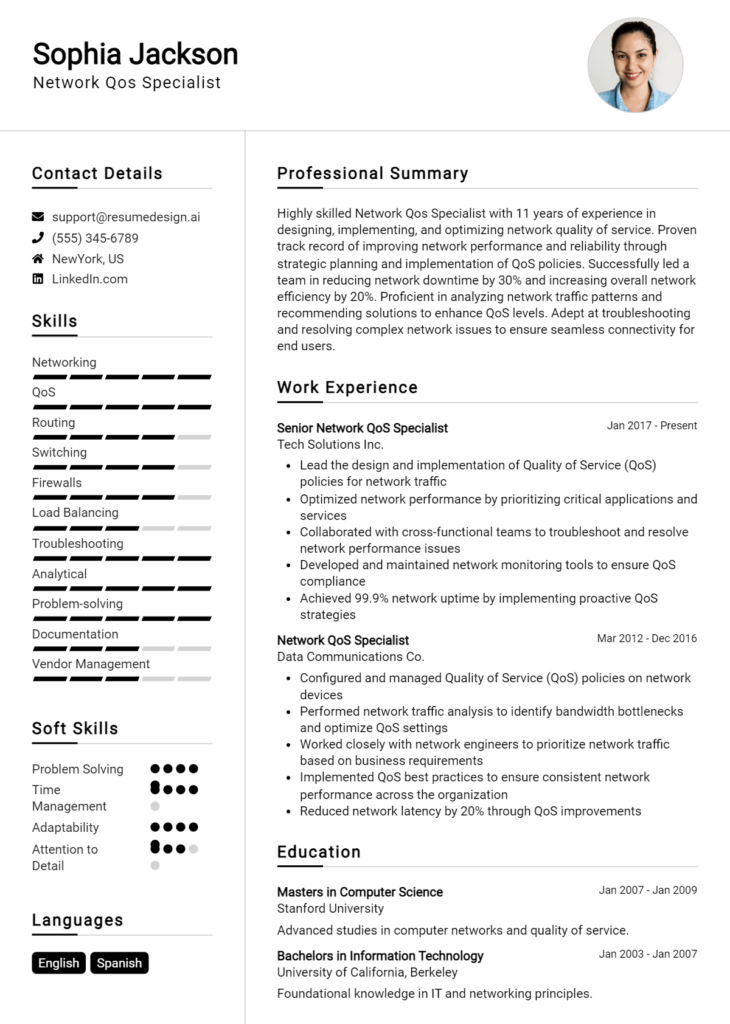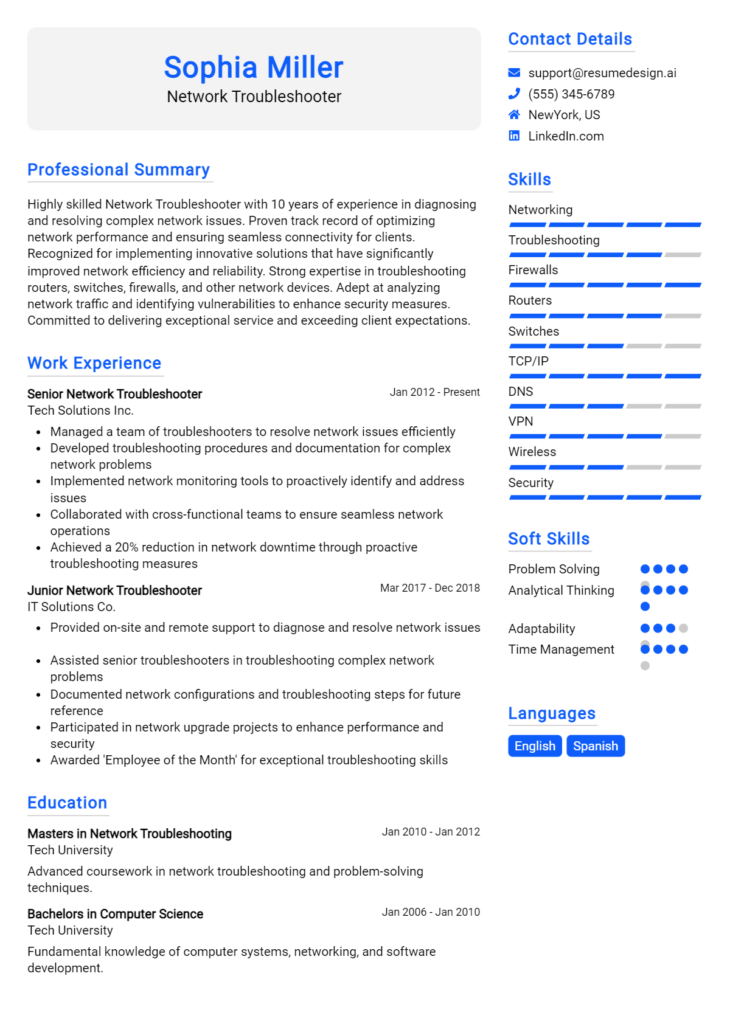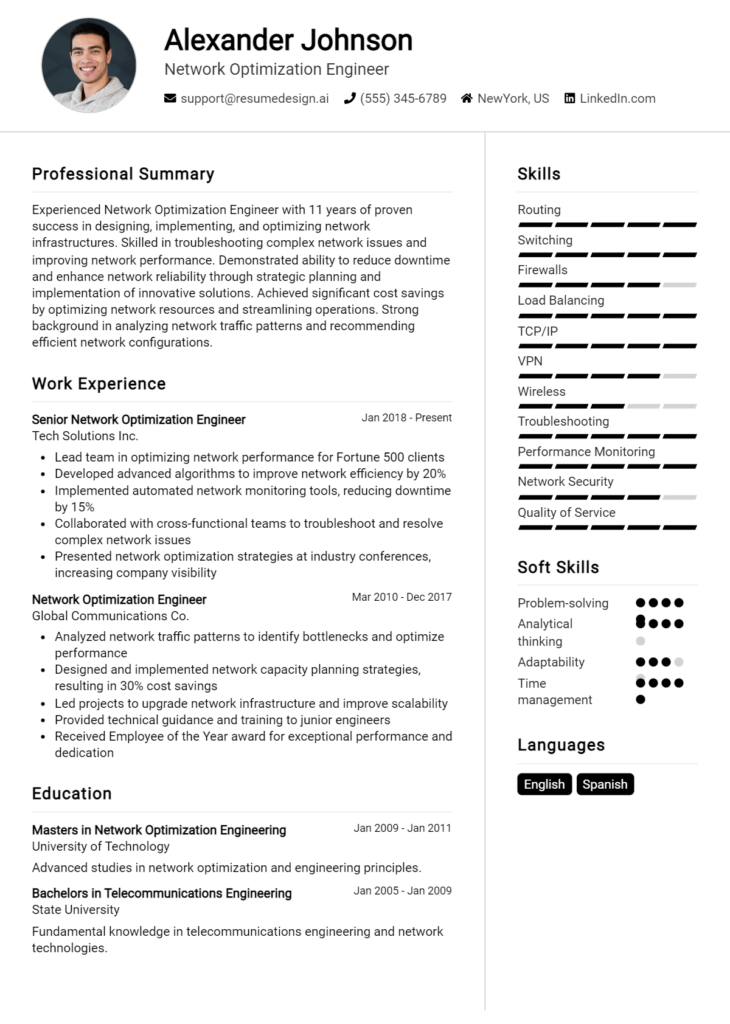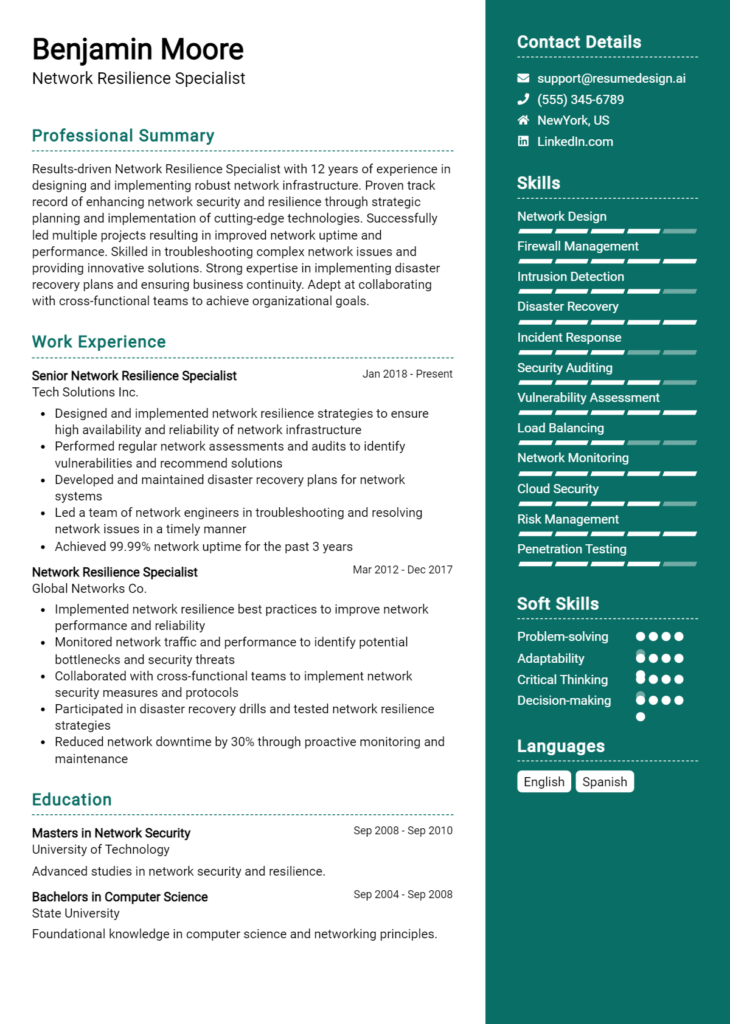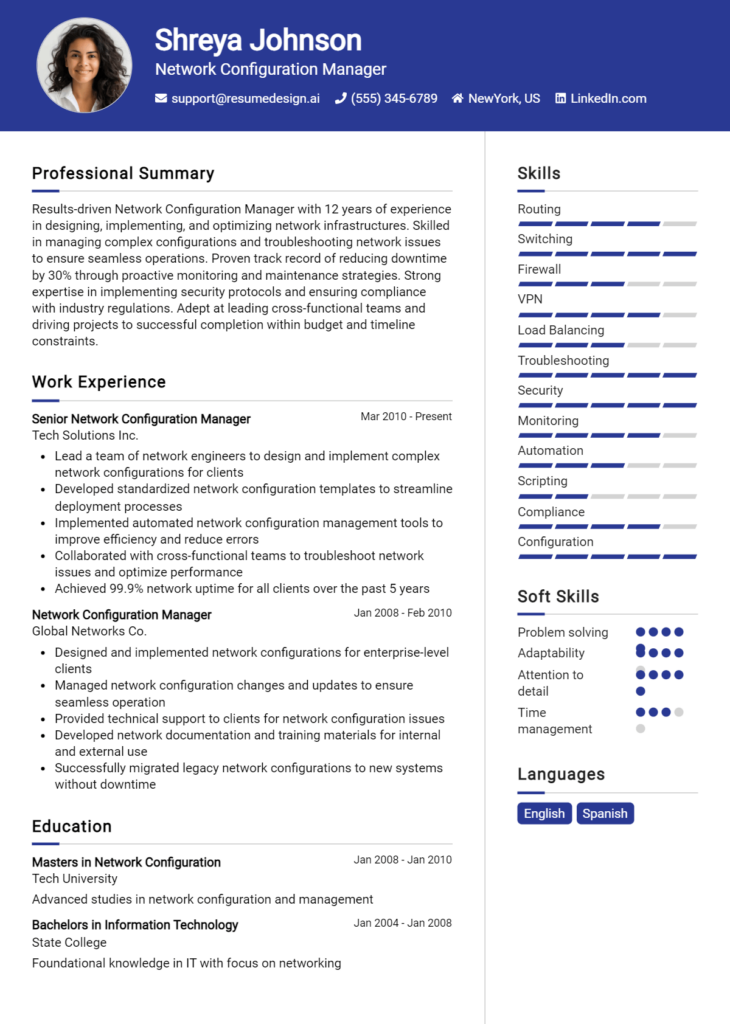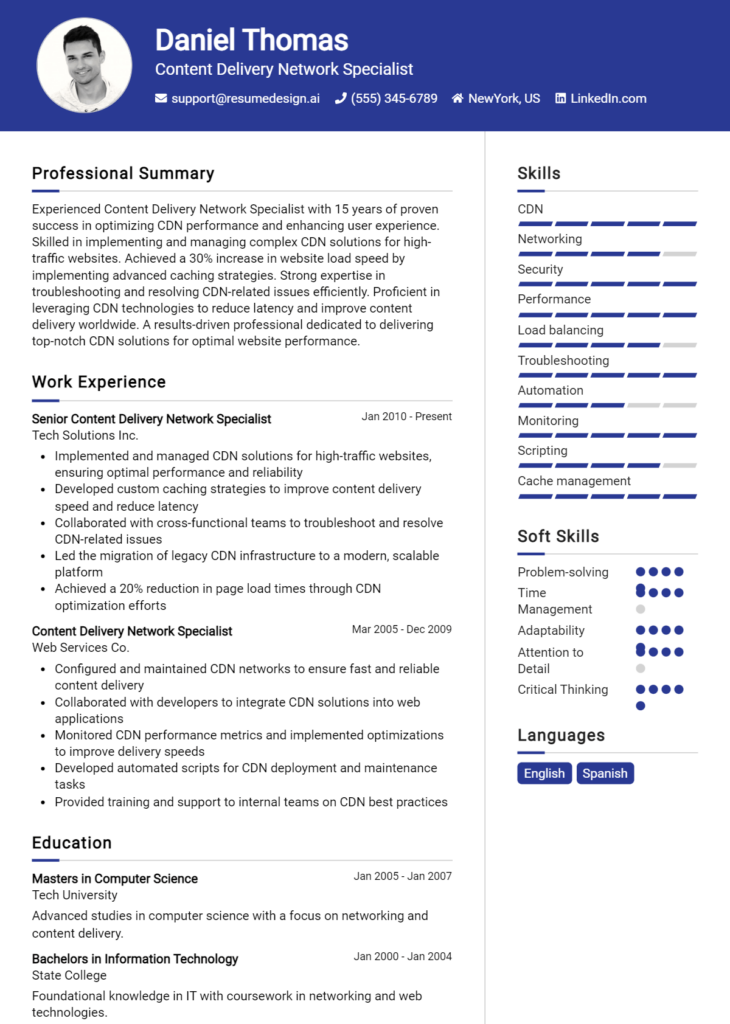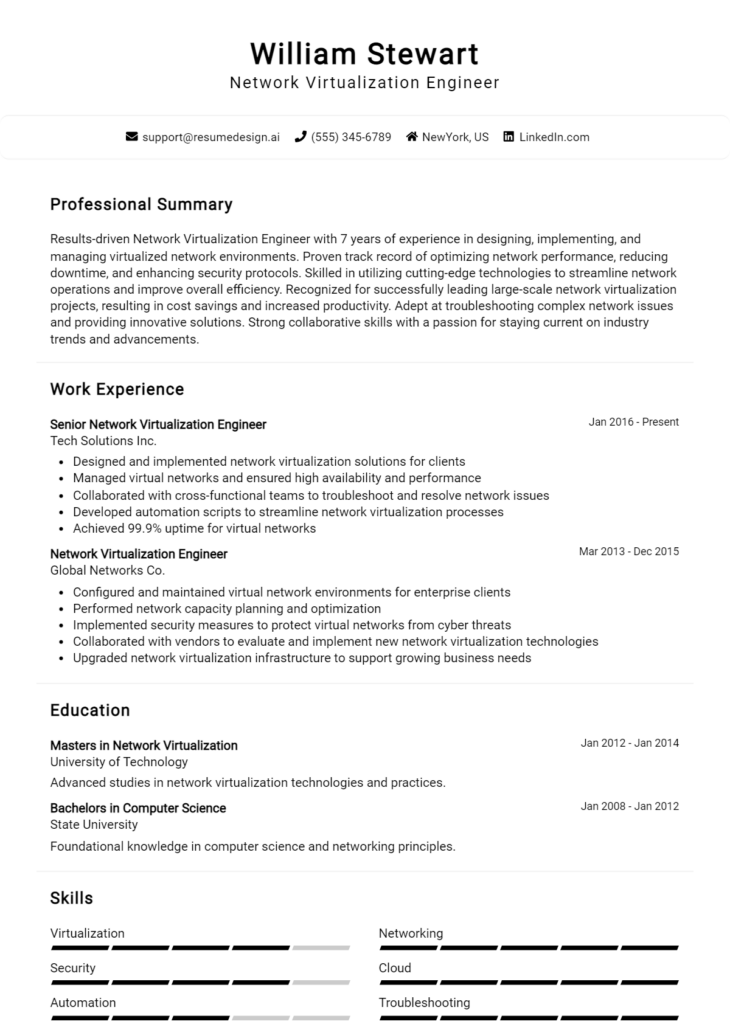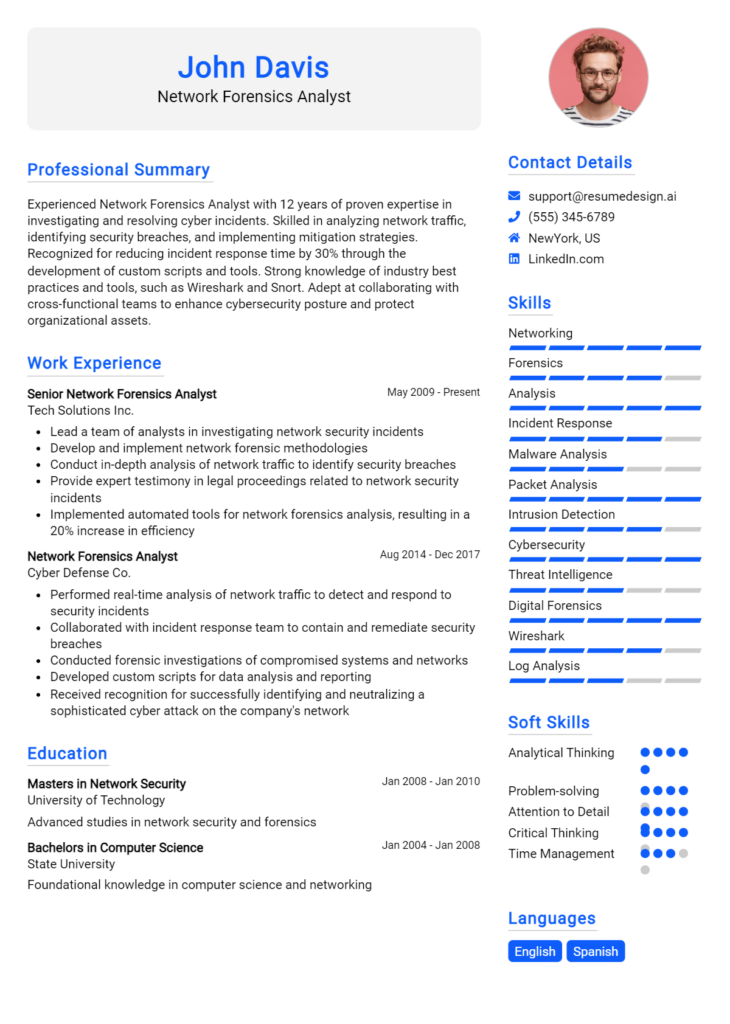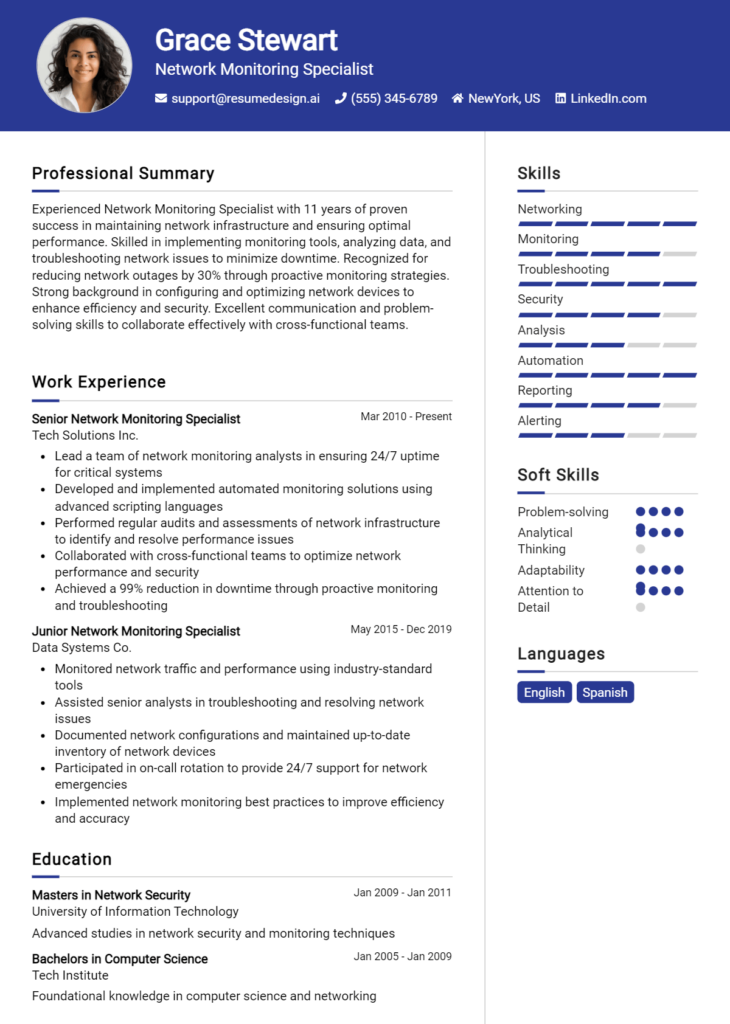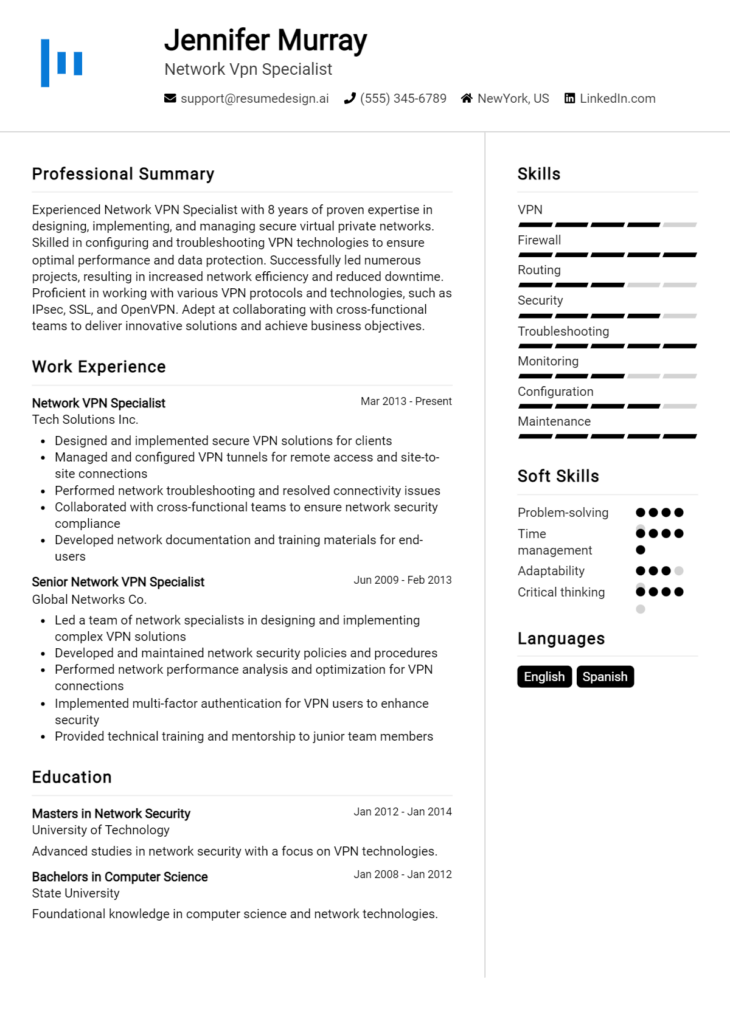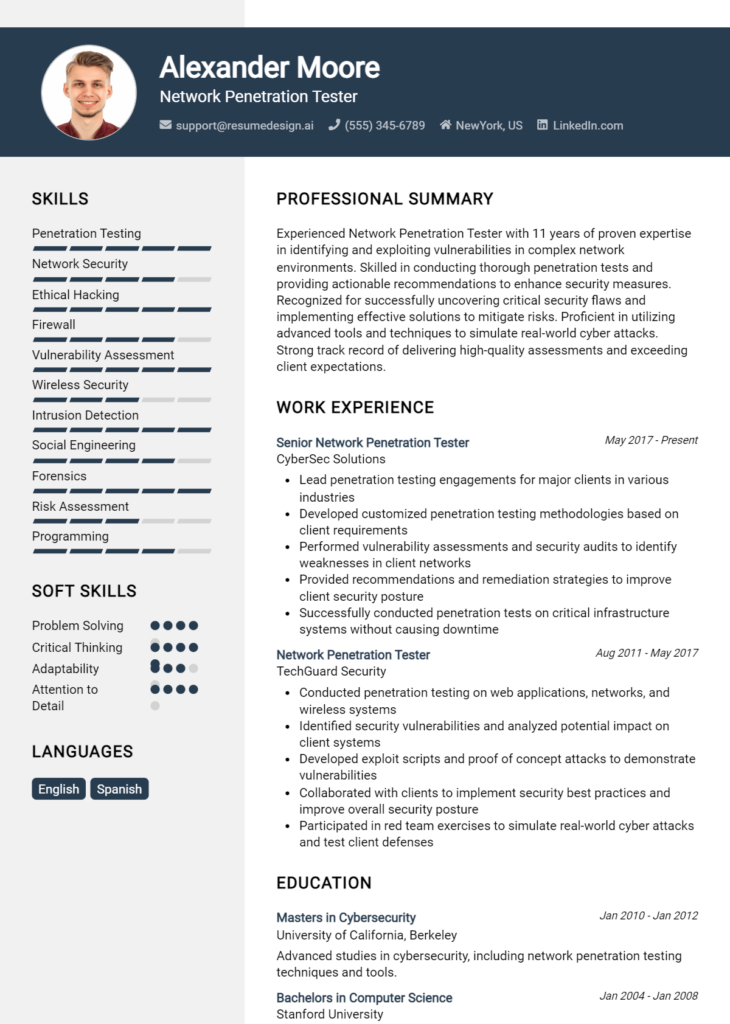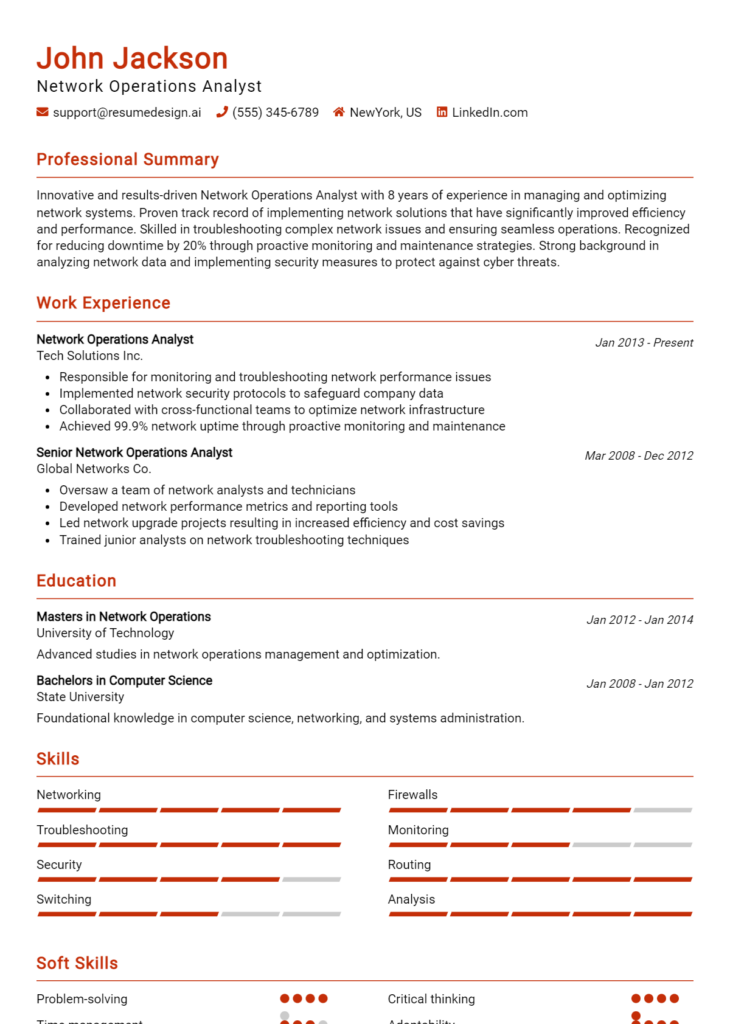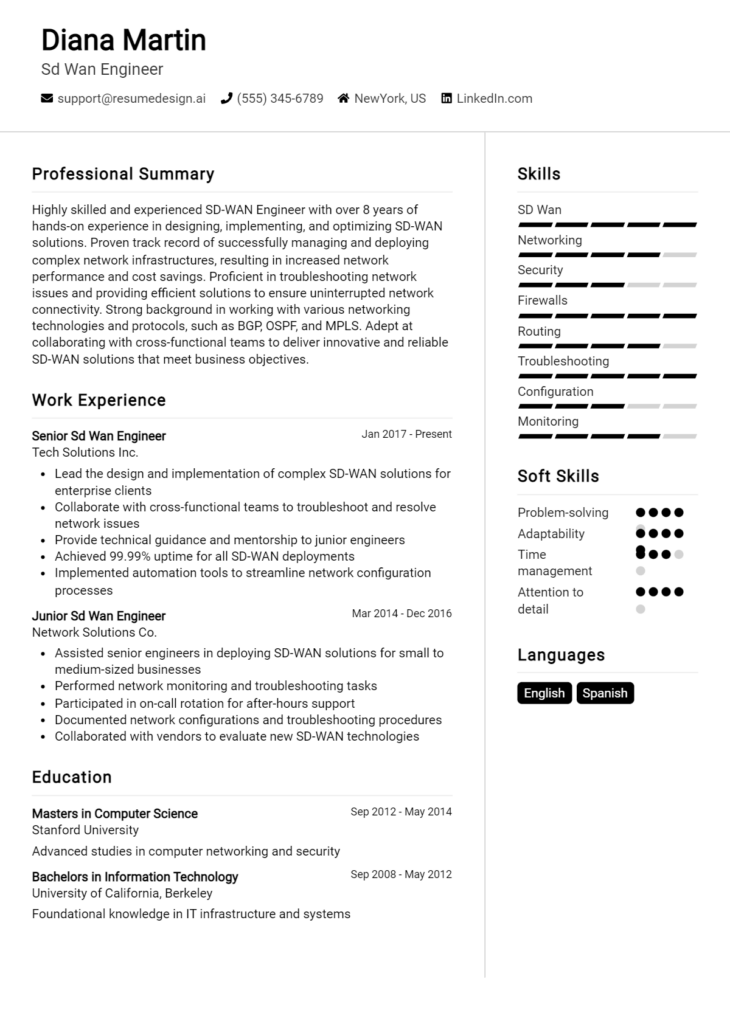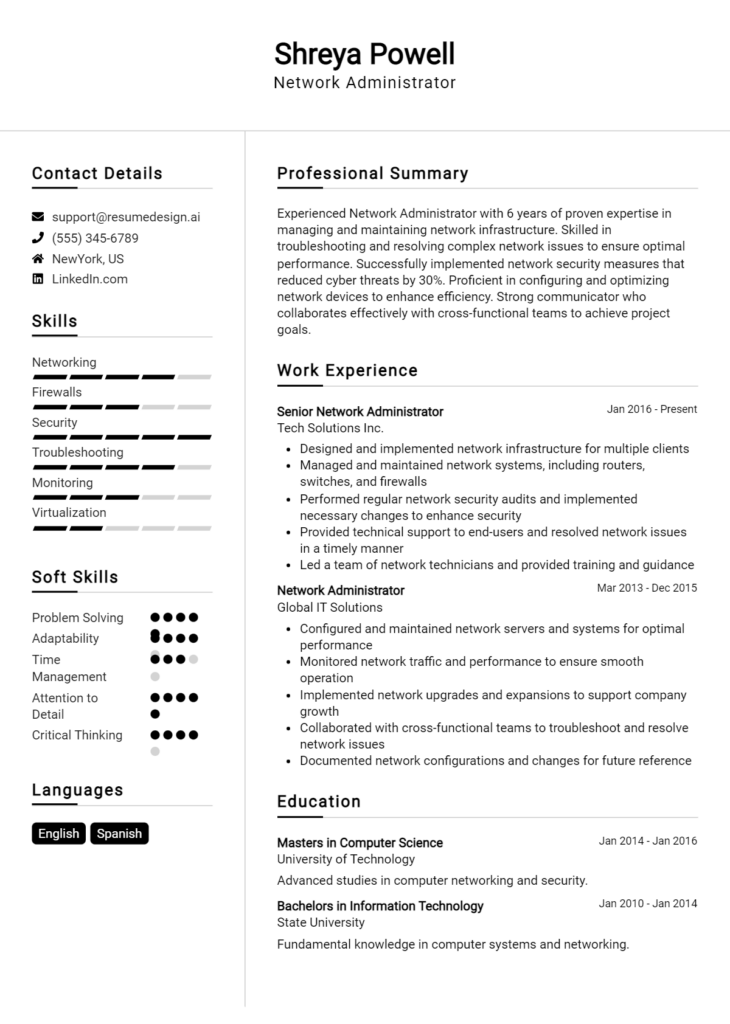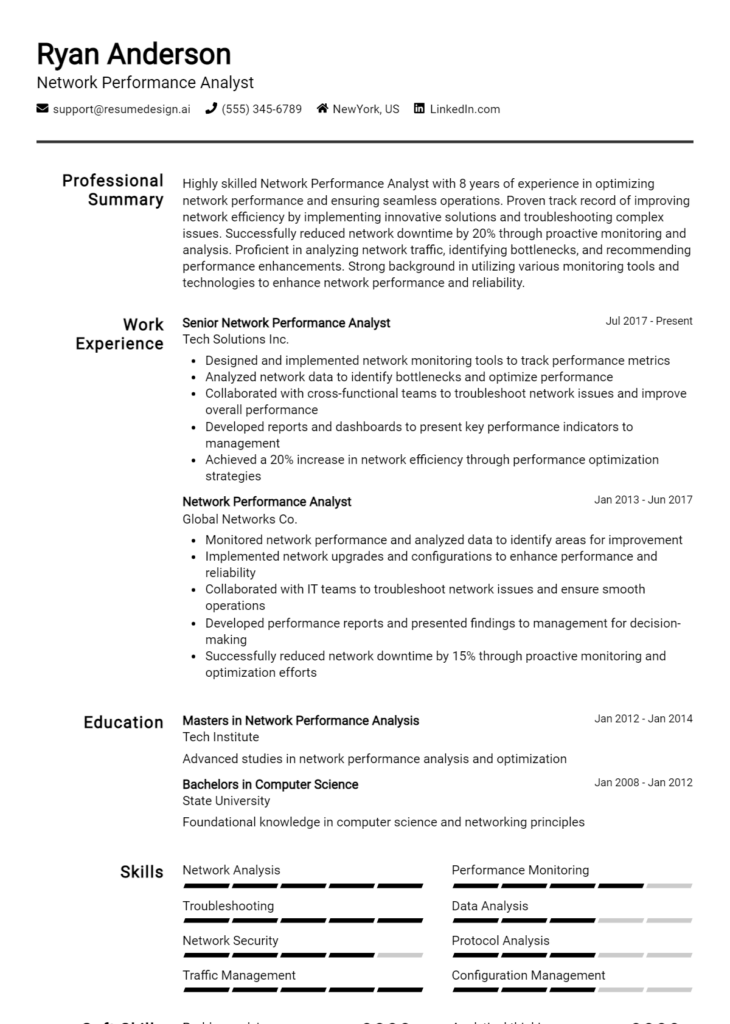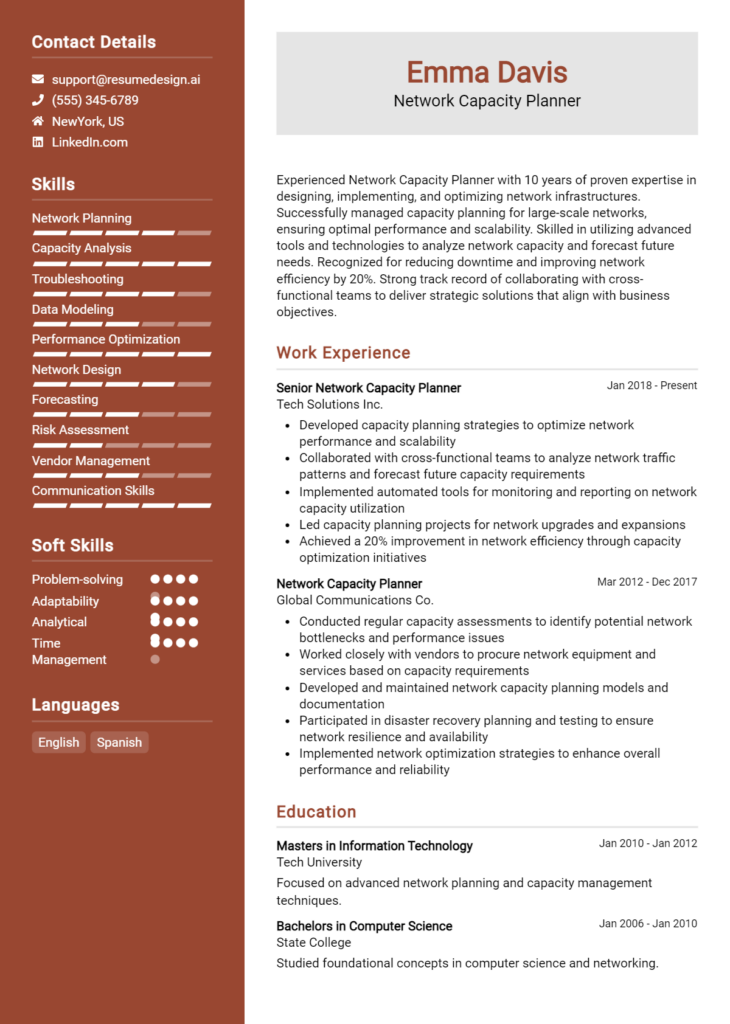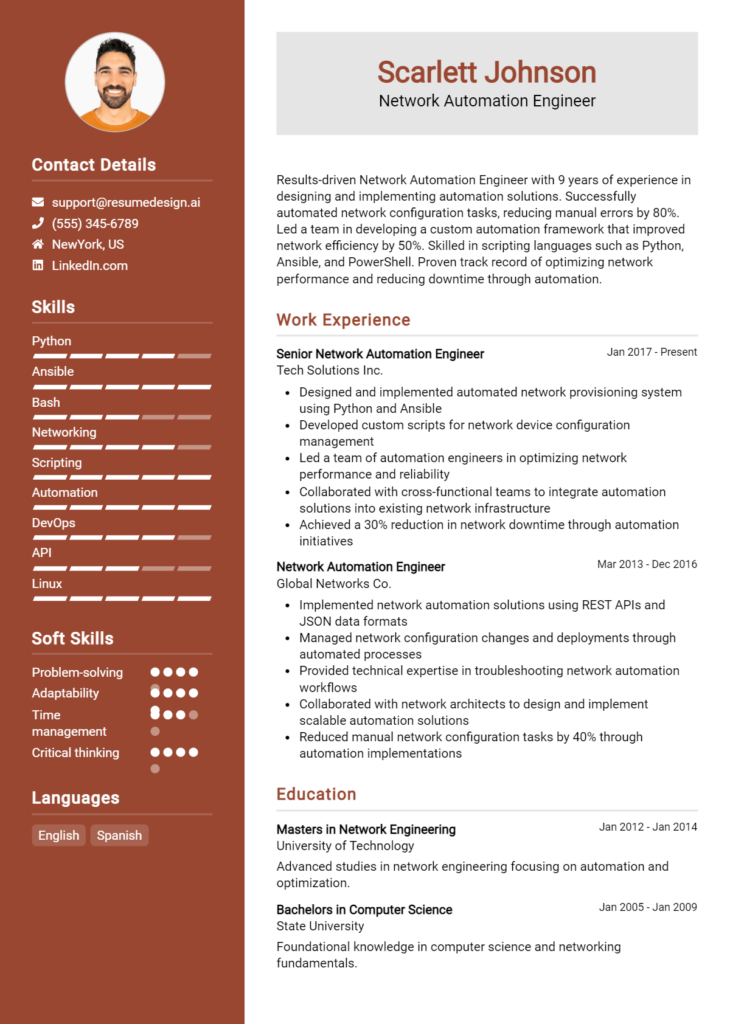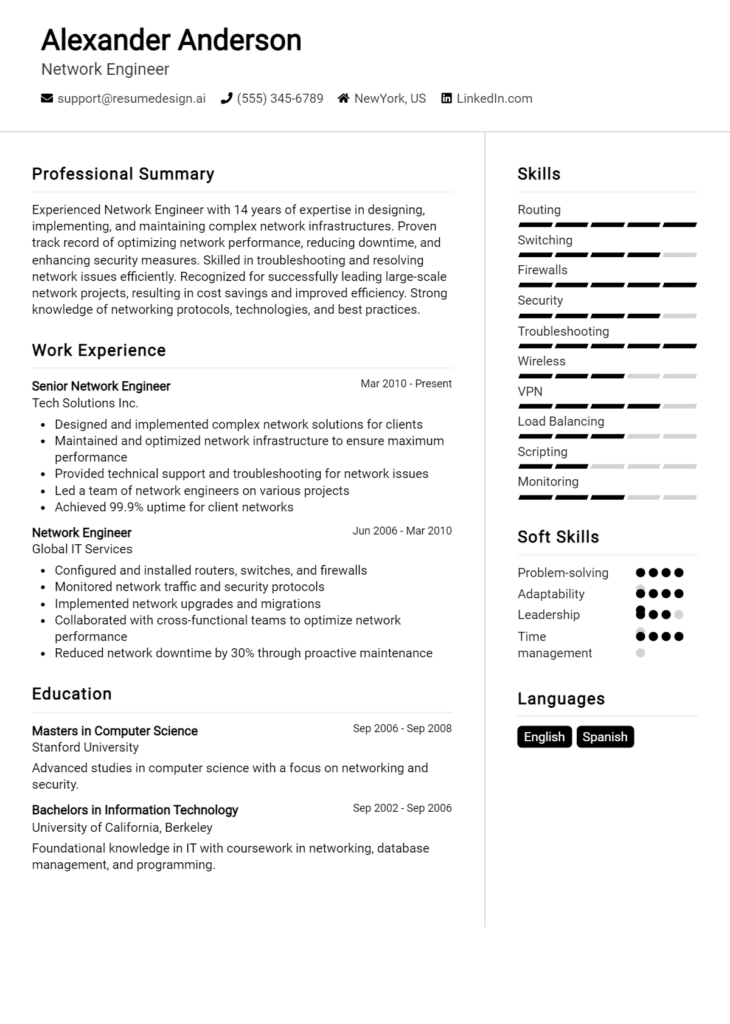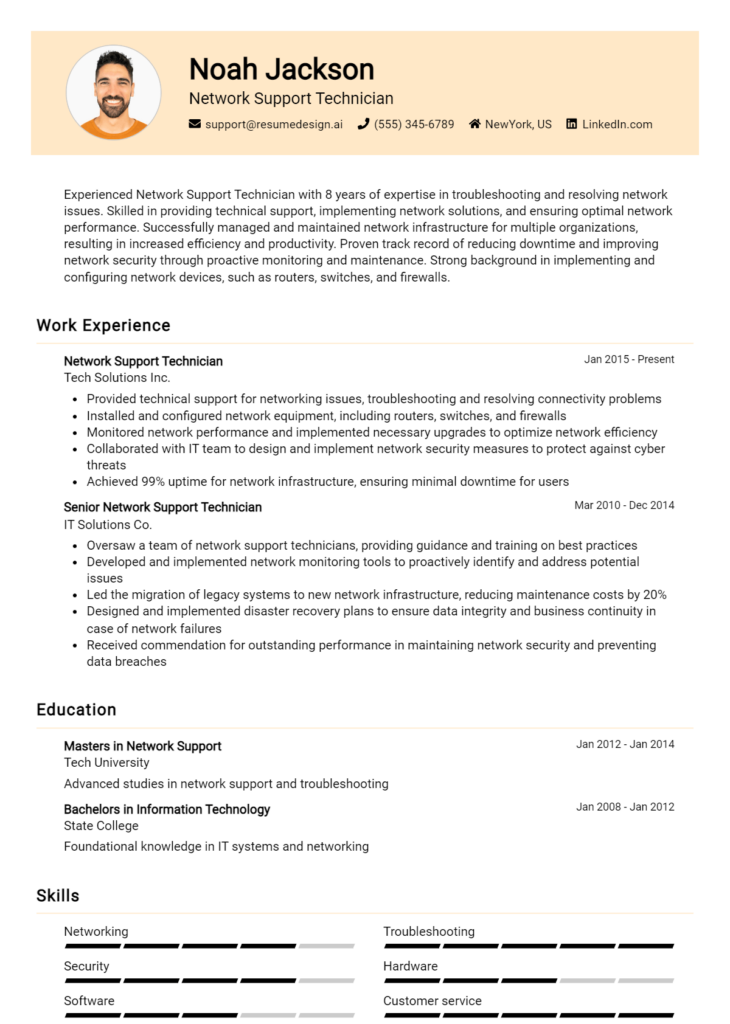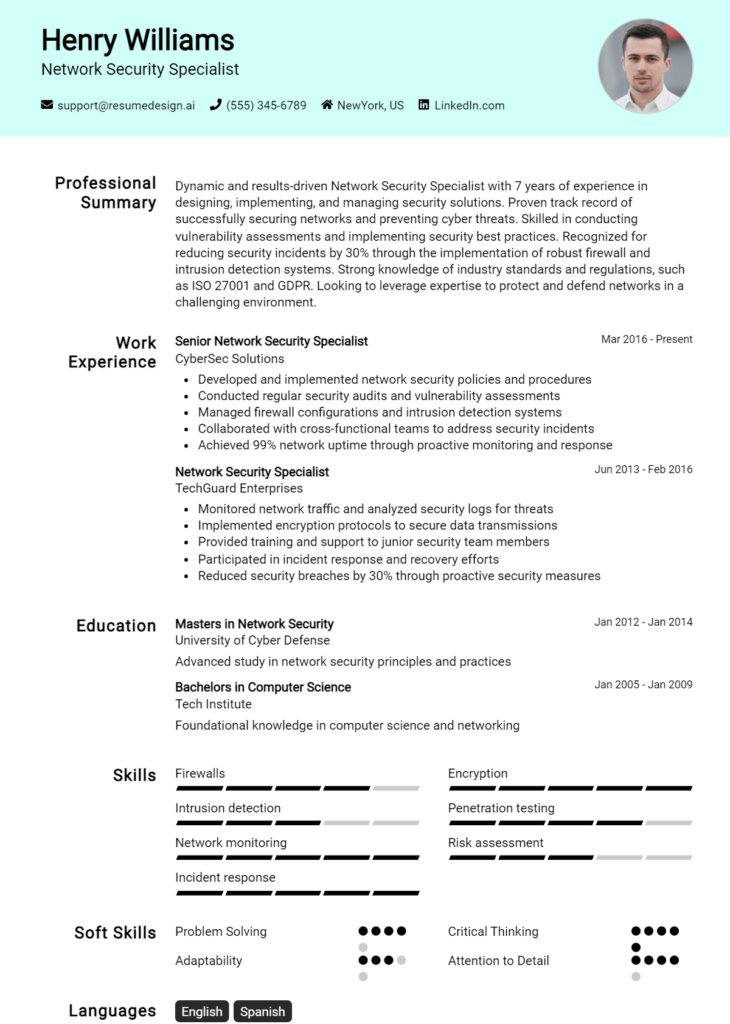Wireless Network Engineer Core Responsibilities
A Wireless Network Engineer is vital in designing, implementing, and maintaining wireless networks that ensure seamless connectivity across various departments. This role requires strong technical skills in network configuration and troubleshooting, alongside operational abilities to manage network performance. Problem-solving skills are crucial for diagnosing issues swiftly, contributing to organizational efficiency. A well-structured resume highlighting these competencies not only showcases expertise but also aligns with the organization's goals for reliable communication and data accessibility.
Common Responsibilities Listed on Wireless Network Engineer Resume
- Design and implement wireless network solutions to meet business needs.
- Conduct site surveys and network assessments to optimize coverage.
- Monitor network performance and troubleshoot connectivity issues.
- Collaborate with IT and security teams to ensure network integrity.
- Develop and maintain documentation for network configurations and policies.
- Configure and manage wireless access points and controllers.
- Stay updated with the latest wireless technologies and trends.
- Provide technical support and training to end-users.
- Implement security measures to protect wireless networks from vulnerabilities.
- Analyze network traffic and performance metrics for continuous improvement.
- Participate in disaster recovery planning and execution.
High-Level Resume Tips for Wireless Network Engineer Professionals
In today's competitive job market, a well-crafted resume is essential for Wireless Network Engineer professionals looking to make a lasting impression on potential employers. Your resume is often the first point of contact with hiring managers, serving as a critical tool to showcase your technical expertise, relevant experiences, and accomplishments in the field. A strong resume not only highlights your skills but also tells the story of your professional journey, positioning you as the ideal candidate for the role. This guide will provide practical and actionable resume tips specifically tailored for Wireless Network Engineer professionals, helping you create a standout application that captures attention.
Top Resume Tips for Wireless Network Engineer Professionals
- Tailor your resume to match the job description, using keywords and phrases that align with the specific role you are applying for.
- Highlight relevant work experience, focusing on positions that specifically involved wireless technologies, networks, or telecommunications.
- Quantify your achievements with specific metrics, such as the percentage of network performance improvement or the number of successful installations completed.
- Incorporate industry-specific skills, such as proficiency in RF design, network optimization, or troubleshooting wireless systems.
- Include certifications relevant to wireless networking, such as CCNA Wireless, CWNP, or similar credentials that demonstrate your expertise.
- Utilize a clear, concise format that enhances readability, ensuring that important information stands out to hiring managers.
- Showcase your problem-solving abilities by detailing specific challenges you faced and how you successfully resolved them.
- Incorporate any experience with emerging technologies, such as 5G or IoT, to demonstrate your forward-thinking approach in the field.
- Keep your resume to one or two pages, ensuring that every word adds value and relevance to your application.
By implementing these tips, you can significantly enhance your resume, increasing your chances of landing a job in the Wireless Network Engineer field. A well-structured and targeted resume not only showcases your qualifications but also communicates your passion and commitment to the profession, making you a more attractive candidate to potential employers.
Why Resume Headlines & Titles are Important for Wireless Network Engineer
In the competitive field of wireless networking, a Wireless Network Engineer's resume must stand out to capture the attention of hiring managers. Resume headlines and titles play a pivotal role in this process, serving as a powerful first impression that summarizes a candidate’s key qualifications in a succinct and impactful manner. A well-crafted headline can immediately convey the candidate's expertise, making it easier for hiring managers to identify suitable applicants at a glance. Therefore, it is crucial for the headline to be concise, relevant, and directly related to the specific job being applied for, ensuring that it resonates with the requirements of the position.
Best Practices for Crafting Resume Headlines for Wireless Network Engineer
- Keep it concise: Aim for one impactful phrase that summarizes your key qualifications.
- Be role-specific: Tailor your headline to reflect the specific position you are applying for.
- Highlight key skills: Include essential technical skills or certifications relevant to wireless networking.
- Showcase experience: Mention years of experience or notable projects that demonstrate your expertise.
- Use industry keywords: Incorporate terminology that resonates with the wireless networking field.
- Avoid clichés: Steer clear of overused phrases that do not add value to your title.
- Be bold: Use strong action words that convey confidence and capability.
- Align with job description: Ensure your headline reflects the qualifications and skills mentioned in the job listing.
Example Resume Headlines for Wireless Network Engineer
Strong Resume Headlines
Certified Wireless Network Engineer with 5+ Years of Experience in High-Density Environments
Proficient in Designing and Implementing Scalable Wireless Solutions for Enterprises
Expert in RF Planning and Network Optimization with Proven Track Record of Reducing Latency
Weak Resume Headlines
Wireless Engineer
Networking Professional Seeking Opportunities
The strong headlines are effective because they provide clear, specific information about the candidate's expertise, making it easy for hiring managers to recognize their suitability for the role. They highlight relevant experience, skills, and certifications, which immediately conveys value. In contrast, the weak headlines fail to impress due to their vagueness and lack of detail. They do not convey the candidate's unique strengths or qualifications, making it difficult for hiring managers to see the potential fit for their needs.
Writing an Exceptional Wireless Network Engineer Resume Summary
A well-crafted resume summary is crucial for a Wireless Network Engineer as it serves as the first impression a hiring manager will have of a candidate. This brief yet impactful statement should quickly capture attention by highlighting key skills, relevant experience, and notable accomplishments that align with the job role. A compelling summary not only showcases the candidate's technical proficiency but also emphasizes their ability to contribute effectively to the organization. To stand out in a competitive field, the summary must be concise and tailored specifically to the job being applied for, ensuring it resonates with the employer's needs and expectations.
Best Practices for Writing a Wireless Network Engineer Resume Summary
- Quantify Achievements: Use numbers and metrics to demonstrate your impact, such as increased network efficiency or reduced downtime.
- Focus on Relevant Skills: Highlight specific skills related to wireless networking, such as RF design, troubleshooting, or network security.
- Tailor for the Job Description: Customize your summary to reflect the keywords and requirements mentioned in the job posting.
- Be Concise: Aim for 2-4 sentences that pack a punch without overwhelming the reader.
- Showcase Certifications: Mention any relevant certifications (e.g., CCNA, CWNP) that demonstrate your qualifications.
- Highlight Problem-Solving Abilities: Emphasize your experience in overcoming challenges and optimizing network performance.
- Use Action Verbs: Start sentences with strong action verbs to convey confidence and proactivity.
- Communicate Soft Skills: Include soft skills like teamwork or communication, which are essential for collaborating with cross-functional teams.
Example Wireless Network Engineer Resume Summaries
Strong Resume Summaries
Dedicated Wireless Network Engineer with over 5 years of experience in designing and optimizing wireless networks for enterprise environments, achieving a 30% increase in throughput and a 25% reduction in latency through innovative RF design and troubleshooting techniques.
Results-driven Wireless Network Engineer with a proven track record of implementing robust network solutions that enhanced connectivity for over 1,000 users, leading to a 40% improvement in user satisfaction ratings as evidenced by customer feedback surveys.
Certified CWNP Wireless Network Engineer skilled in deploying and managing large-scale wireless networks. Successfully reduced operational costs by 20% through strategic vendor negotiations and efficient resource allocation.
Innovative Wireless Network Engineer with expertise in network security and performance optimization, having led a project that secured a network infrastructure for a multinational company, resulting in zero breaches over 3 years.
Weak Resume Summaries
Wireless Network Engineer with some experience in networking and troubleshooting. Good at solving problems and working with teams.
I have worked in IT for several years and know a bit about wireless networks. I hope to find a job in this area.
The strong resume summaries are considered effective because they include quantifiable results, specific skills relevant to the Wireless Network Engineer role, and demonstrate a direct impact on the organization. In contrast, the weak summaries lack detail, provide no measurable outcomes, and come across as generic, failing to capture the attention of hiring managers or showcase the candidate's true potential.
Work Experience Section for Wireless Network Engineer Resume
The work experience section in a Wireless Network Engineer resume is pivotal as it provides a comprehensive overview of the candidate's technical acumen, leadership capabilities, and ability to deliver high-quality network solutions. This section not only showcases the candidate's hands-on experience with wireless technologies and protocols but also highlights their proficiency in managing teams and projects effectively. By quantifying achievements, such as improvements in network performance or successful project completions, and aligning their experience with industry standards, candidates can significantly enhance their appeal to potential employers.
Best Practices for Wireless Network Engineer Work Experience
- Detail your technical skills with specific technologies, protocols, and tools used in your projects.
- Quantify your achievements with metrics such as network uptime improvement, latency reduction, or bandwidth increase.
- Highlight your role in team projects, emphasizing collaboration and leadership within cross-functional teams.
- Use action verbs to start bullet points, showcasing initiative and impact.
- Align your experiences with industry standards and trends to demonstrate relevance.
- Focus on results-oriented statements that reflect your contributions to the organization's objectives.
- Include certifications and training that complement your work experience.
- Tailor your experience to the job description, emphasizing skills and projects that align with the prospective employer's needs.
Example Work Experiences for Wireless Network Engineer
Strong Experiences
- Led a team of engineers to design and implement a new wireless network infrastructure, resulting in a 30% increase in network efficiency and a 20% reduction in operational costs.
- Successfully managed a project to upgrade existing wireless systems, achieving 99.9% network uptime and improving user satisfaction ratings by 40% within six months.
- Implemented a comprehensive training program for junior engineers, which enhanced team skills and reduced project completion times by 25%.
Weak Experiences
- Worked on various network projects and contributed to team discussions.
- Assisted in troubleshooting wireless issues and reported findings to senior engineers.
- Participated in regular meetings and provided updates on project statuses.
The examples provided illustrate the distinction between strong and weak experiences. Strong experiences focus on quantifiable outcomes, showcasing leadership, initiative, and concrete results that add value to the organization. In contrast, weak experiences lack specificity and measurable impact, often relying on vague statements that do not effectively convey the candidate's contributions or skills. Highlighting achievements and responsibilities in a clear, results-oriented manner is essential for standing out in the competitive field of wireless network engineering.
Education and Certifications Section for Wireless Network Engineer Resume
The Education and Certifications section of a Wireless Network Engineer resume is crucial for showcasing a candidate's academic background and industry-relevant credentials. This section not only highlights formal education but also emphasizes certifications and specialized training that are vital in the ever-evolving field of wireless networking. By including relevant coursework and recognized certifications, candidates can significantly enhance their credibility, demonstrating their commitment to continuous learning and alignment with the specific requirements of the job role. A well-crafted education and certifications section can set a candidate apart from others, showcasing their technical knowledge and readiness to address the challenges of wireless network engineering.
Best Practices for Wireless Network Engineer Education and Certifications
- Prioritize relevant degrees such as Computer Science, Information Technology, or Network Engineering.
- List industry-recognized certifications like Cisco Certified Network Associate (CCNA) or Certified Wireless Network Administrator (CWNA).
- Include any specialized training courses related to wireless technologies and protocols.
- Highlight any relevant coursework that demonstrates knowledge of wireless networking concepts.
- Keep the formatting consistent and professional for easy readability.
- Update this section regularly to reflect new certifications or educational achievements.
- Consider including GPA or honors if they are particularly strong and relevant.
- Showcase any hands-on projects or lab work as part of your educational experience.
Example Education and Certifications for Wireless Network Engineer
Strong Examples
- Bachelor of Science in Computer Networking, University of Technology, 2020
- Cisco Certified Network Professional (CCNP) - Wireless, 2022
- Certified Wireless Network Expert (CWNE), 2023
- Coursework: Advanced Wireless Networking, Network Security, and Wireless Protocols
Weak Examples
- Associate Degree in General Studies, Community College, 2015
- Microsoft Certified Solutions Expert (MCSE) - Outdated certification for current wireless engineering roles
- Certificate in Basic Computer Skills, Online Course, 2019
- Coursework: Introduction to Psychology and Art History
The strong examples are considered relevant because they directly reflect the skills and knowledge required for a Wireless Network Engineer position, demonstrating both foundational and advanced expertise in wireless networking. In contrast, the weak examples lack relevance to the specific demands of the role, featuring outdated or unrelated credentials that do not support the candidate's qualifications in the field of wireless networking.
Top Skills & Keywords for Wireless Network Engineer Resume
In the fast-evolving field of wireless networking, having the right skills on your resume is crucial for standing out to potential employers. A Wireless Network Engineer is responsible for the design, implementation, and maintenance of wireless networks, which requires a unique blend of technical and interpersonal skills. Highlighting both your hard and soft skills effectively can demonstrate your capability to not only manage complex systems but also work collaboratively with teams and clients. This dual focus on skills can greatly enhance your resume, making it a compelling representation of your qualifications and expertise in the wireless networking domain. For more insights on how to showcase your skills and work experience, continue reading.
Top Hard & Soft Skills for Wireless Network Engineer
Hard Skills
- Wireless Network Design
- Network Security Protocols (WPA, WPA2, WPA3)
- RF (Radio Frequency) Engineering
- Network Performance Optimization
- VLAN and Subnetting
- Wireless Site Surveying
- Troubleshooting Wireless Connectivity Issues
- Knowledge of 802.11 Standards
- Network Monitoring Tools (e.g., Wireshark, SolarWinds)
- Familiarity with Cisco, Juniper, and other network equipment
- Experience with Cloud Networking Solutions
- Load Balancing Techniques
- VoIP (Voice over Internet Protocol) Knowledge
- VPN Configuration and Management
- Knowledge of IoT (Internet of Things) Networking
- Scripting and Automation (e.g., Python, Bash)
- Familiarity with Network Management Systems (NMS)
- Quality of Service (QoS) Management
Soft Skills
- Strong Communication Skills
- Problem-Solving Ability
- Team Collaboration
- Adaptability and Flexibility
- Attention to Detail
- Time Management
- Critical Thinking
- Project Management
- Customer Service Orientation
- Analytical Skills
- Conflict Resolution
- Creativity in Troubleshooting
- Ability to Work Under Pressure
- Interpersonal Skills
- Initiative and Proactiveness
- Continuous Learning Mindset
- Empathy and Understanding of Client Needs
- Leadership Potential
Stand Out with a Winning Wireless Network Engineer Cover Letter
Dear [Hiring Manager's Name],
I am writing to express my interest in the Wireless Network Engineer position at [Company Name] as advertised on [where you found the job listing]. With a robust background in designing, implementing, and managing wireless networks, coupled with my strong problem-solving skills and attention to detail, I am confident in my ability to contribute effectively to your team. My hands-on experience with a range of wireless technologies, including Wi-Fi, LTE, and 5G, positions me well to support your organization’s objectives in delivering seamless connectivity.
In my previous role at [Previous Company Name], I successfully led several projects that involved the deployment of large-scale wireless networks. This included conducting site surveys, analyzing RF coverage, and troubleshooting connectivity issues to enhance network performance and reliability. My technical expertise in tools such as Ekahau and Cisco Prime, combined with my knowledge of network protocols and security measures, enables me to ensure that wireless systems are not only efficient but also secure against potential threats. Furthermore, my proactive approach to performance monitoring and optimization has resulted in a 30% improvement in user satisfaction ratings based on network reliability.
I am particularly drawn to [Company Name] because of your commitment to innovation and excellence in wireless communication technologies. I admire your recent initiatives in [mention any relevant project or technology the company is known for], and I am eager to contribute my skills in network design and optimization to further enhance your offerings. I am excited about the opportunity to collaborate with a talented team and leverage my expertise to address the challenges of modern wireless networking.
Thank you for considering my application. I look forward to the possibility of discussing how my background, skills, and enthusiasms align with the goals of [Company Name]. I am eager to bring my passion for wireless technology and my commitment to excellence to your esteemed company.
Sincerely,
[Your Name]
[Your LinkedIn Profile]
[Your Contact Information]
Common Mistakes to Avoid in a Wireless Network Engineer Resume
When crafting a resume for a Wireless Network Engineer position, it’s essential to present your skills and experience in a clear and compelling manner. However, many applicants make common mistakes that can undermine their chances of landing an interview. To help you create an effective resume, here are several pitfalls to avoid:
Lack of Specificity: Failing to include specific technologies or protocols you’ve worked with (e.g., Wi-Fi standards, network security protocols) can make your resume less impactful. Tailor your experience to highlight relevant skills.
Too Much Jargon: While technical expertise is crucial, using excessive technical jargon can alienate hiring managers who may not be familiar with every term. Aim for a balance that showcases your knowledge while remaining accessible.
Neglecting Soft Skills: Many engineers overlook the importance of soft skills such as teamwork, communication, and problem-solving. Highlighting these skills can demonstrate your ability to collaborate effectively in a team environment.
Ignoring Quantifiable Achievements: Resumes that list responsibilities without quantifiable accomplishments can come across as generic. Use metrics to showcase your contributions, such as reduced downtime or improved network performance.
Poor Formatting: A cluttered or overly complex format can hinder readability. Use a clean, professional layout with clear headings and bullet points to enhance the visual appeal of your resume.
Missing Keywords: Many companies use Applicant Tracking Systems (ATS) to screen resumes. Failing to include relevant keywords from the job description can result in your resume being overlooked.
Overemphasis on Education: While educational qualifications are important, focusing too heavily on them at the expense of practical experience can diminish your appeal. Prioritize hands-on experience and certifications relevant to wireless networking.
Omitting Continuous Learning: The field of wireless networking is constantly evolving. Not mentioning ongoing education, certifications, or relevant courses may suggest a lack of commitment to staying current in the field.
Conclusion
As a Wireless Network Engineer, you play a crucial role in designing, implementing, and maintaining wireless networks that enable seamless connectivity for users. Throughout this article, we explored the essential skills required for the position, including expertise in network protocols, troubleshooting techniques, and knowledge of the latest wireless technologies. Additionally, we discussed the importance of certifications and continuous learning in staying updated with industry trends.
To ensure you stand out in the competitive job market, it’s vital to have a polished resume that effectively showcases your qualifications and experiences. We encourage you to take a moment to review your Wireless Network Engineer resume and make any necessary updates.
Utilize the following resources to enhance your resume and job application process:
- Explore a variety of resume templates to find a style that suits your professional image.
- Use the resume builder for a user-friendly experience in crafting your resume from scratch or refining your existing one.
- Check out resume examples for inspiration and insights on how to effectively present your skills and achievements.
- Don’t forget to create a compelling cover letter using our cover letter templates to accompany your resume.
Taking these steps will not only improve the quality of your application but also increase your chances of landing your desired role as a Wireless Network Engineer. Start revamping your resume today!

